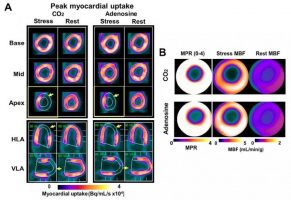- Home
- Editorial
- News
- Practice Guidelines
- Anesthesiology Guidelines
- Cancer Guidelines
- Cardiac Sciences Guidelines
- Critical Care Guidelines
- Dentistry Guidelines
- Dermatology Guidelines
- Diabetes and Endo Guidelines
- Diagnostics Guidelines
- ENT Guidelines
- Featured Practice Guidelines
- Gastroenterology Guidelines
- Geriatrics Guidelines
- Medicine Guidelines
- Nephrology Guidelines
- Neurosciences Guidelines
- Obs and Gynae Guidelines
- Ophthalmology Guidelines
- Orthopaedics Guidelines
- Paediatrics Guidelines
- Psychiatry Guidelines
- Pulmonology Guidelines
- Radiology Guidelines
- Surgery Guidelines
- Urology Guidelines
PET-MR shows arterial CO2 as potent vasodilator for cardiac stress testing

More than 5 million cardiac stress tests performed annually in the U.S. employ injectable forms of pharmacological stress agents -- such as adenosine or one of its analogues -- to dilate blood vessels in the heart. However, these drugs can have severe side effects. Using PET/MR imaging, a new international study featured in the June issue of The Journal of Nuclear Medicine demonstrates that increases in partial pressure of arterial carbon dioxide (PaCO2) can safely and efficiently widen blood vessels of the heart during stress tests to help determine heart function.
Myocardial blood flow (MBF) is critical in determining heart function. While PaCO2's effect on MBF has been studied extensively in the past, previous findings have been inconclusive due to difficulty in quickly controlling PaCO2 to limit hypercapnia (too much carbon dioxide in the blood) and uncertain measures of the outcome variable. In this new study, these issues have been addressed.
"We have overcome these technical difficulties by incorporating new technology that can accurately, precisely and rapidly control arterial blood gas levels, and we have quantified the MBF response with 13N-ammonia PET, the gold standard approach for measuring MBF, in a clinically relevant animal model," explains Rohan Dharmakumar, PhD, of the Cedars-Sinai Medical Center and University of California, Los Angeles, California. "We report for the first time that a physiologically tolerable increase in PaCO2(~25 mmHg) amplifies MBF more than two-fold, a key feature of clinically meaningful coronary vasodilators used for cardiac stress testing."
The study included three groups of canines:
(1) without coronary stenosis,
(2) with non-flow limiting stenosis and
(3) pre-administered caffeine (which inhibits adenosine and can affect stress-test results).
In all cases, PaCO2 proved just as effective at inducing MBF as the standard dose of adenosine and performs better than adenosine in animals pre-administered with caffeine.
"This key finding opens the door to a completely new protocol for cardiac stress testing -- one that has the potential to benefit numerous patients who are contraindicated for commonly used pharmacological stress agents," says Dharmakumar. "Since hypercapnia is safe and effective when its magnitude is tightly controlled, it could also empower repeat stress testing in target populations with heart disease -- overcoming a limitation of current stress tests that rely on injectable pharmacological agents."
You can read the full article by clicking on the following link
Hsin-Jung Yang, Damini Dey, Jane Sykes, Michael Klein, John Butler, Michael S. Kovacs, Olivia Sobczyk, Behzad Sharif, Xiaoming Bi, Avinash Kali, Ivan Cokic, Richard Tang, Roya Yumul, Antonio H. Conte, Sotirios A. Tsaftaris, Mourad Tighiouart, Debiao Li, Piotr J. Slomka, Daniel S. Berman, Frank S. Prato, Joseph A. Fisher, Rohan Dharmakumar. Arterial CO 2 as a Potent Coronary Vasodilator: A Preclinical PET/MR Validation Study with Implications for Cardiac Stress Testing. Journal of Nuclear Medicine, 2017; 58 (6): 953 DOI: 10.2967/jnumed.116.185991

Disclaimer: This site is primarily intended for healthcare professionals. Any content/information on this website does not replace the advice of medical and/or health professionals and should not be construed as medical/diagnostic advice/endorsement or prescription. Use of this site is subject to our terms of use, privacy policy, advertisement policy. © 2020 Minerva Medical Treatment Pvt Ltd